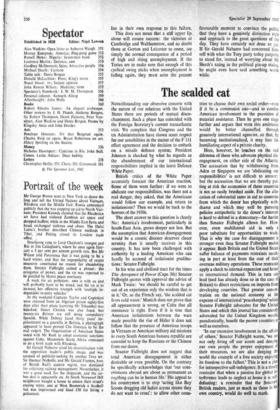The scalded cat
Notwithstanding our obsessive concern with the nature of our relations with the United States there are periods of mutual disen- chantment. Such a phase has coincided with the Foreign Secretary's current transatlantic visit. We complain that Congress and the us Administration have shown scant respect for our sensibilities in the matter of the F 111 offset agreement and the decision to embark on a missile defence system; President Johnson is shocked by what he regards as the abandonment of our international responsibilities implied in the latest Defence White Paper.
British critics of the White Paper accurately forecast the American reaction. Some of them went further: if we were to abdicate our responsibilities, was there not a real danger, they asked, that the Americans would follow our example, and return to isolationism? Then we would be back to the horrors of the 1930s.
The short answer to this question is clearly No: America's involvement, particularly in South-East Asia, grows deeper not less. But the assumption that American disengagement would be a cosmic disaster deserves closer scrutiny than it usually receives in this country. It has now been challenged with authority by a leading American who can hardly be accused of isolationist predilec- tions: Senator Fulbright.
In his wise and civilised tract for the times The Arrogance of Power (Cape 30s) Senator Fulbright quotes with approval the advice of Mark Twain: 'we should be careful to get out of an experience only the wisdom that is in it.' Or, as the French say, 'the scalded cat fears cold water.' Munich does not prove that all appeasement is wrong, or Cuba that all resistance is right. Even if it is true that American isolationism between the wars made possible the rise of Hitler it does not follow that the presence of American troops in Vietnam or American military aid missions in every South American banana republic are essential to keep the Russians or the Chinese from our doors.
Senator Fulbright does not suggest that total American disengagement is either desirable or even possible. On the contrary he specifically acknowledges that 'our com- mitments abroad are about as permanent as anything can be in human life.' His appeal to his countrymen is to stop 'acting like Boy Scouts dragging old ladies across streets they do not want to cross': to allow other coun- tries to choose their own social order—e%en if it be a communist one—and to confine American involvement to the provision of material assistance. Then he goes one stage further and argues that even this assistance would be better channelled through genuinely international agencies, so that, by becoming institutionalised, it may lose the humiliating aspect of a private charity.
Here, however, he touches on the real dilemma of those who advocate physical dis- engagement, on either side of the Atlantic. The accusation that by withdrawing from Aden or Singapore we are 'abdicating our responsibilities' is not difficult to answer: but the accusation that we are thereby put- ting at risk the economies of these countries is not so easily brushed aside. For the allo- cation of substantial sums in aid to countries from which the donor has physically with- drawn and which may well be pursuing policies antipathetic to the donor's interests is hard to defend in a democracy—far harder than Senator Fulbright allows for. How• ever, even multilateral aid is only a poor substitute for opportunities to trade.
That is why the case for disengagement is stronger even than Senator Fulbright makes it appear. uoth Britain and the United States suffer balance of payments restraints result- ing in part at least from the cost of their overseas military operations. These restraints apply a check to internal expansion and hence to international demand. This in turn can lead (and has already done so in the case of Britain) to direct restrictions on imports from developing countries. That greater concen- tration on the national economy at the expense of international 'peacekeeping' which Senator Fulbright advocates for the United States and which this journal has consistently advocated for the United Kingdom would, paradoxically, benefit the poorer countries al well as ourselves.
'In our excessive involvement in the affairs of others,' Senator Fulbright warns, 'we are not only living off our assets and denying our own people the proper enjoyment of their resources, we are also denying the world the example of a free society enjoying its freedom to the fullest.' This is not a plea for introspective self-indulgence. It is a timely reminder that when a passion for global lt terference leads to neglect at home it is self- defeating: a reminder that the Senator's British readers, just as much as those in be own country, would do well to mark.






































 Previous page
Previous page